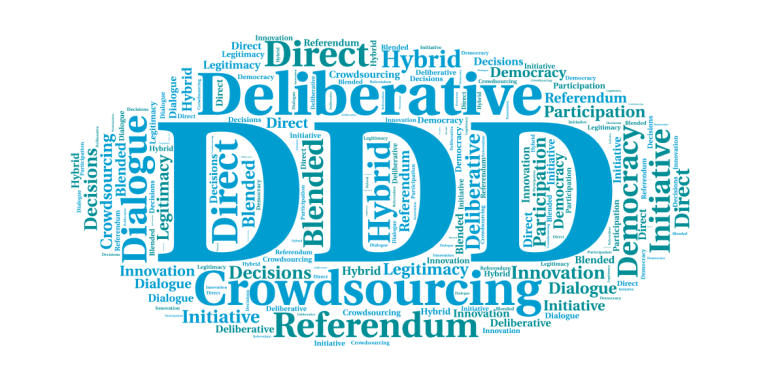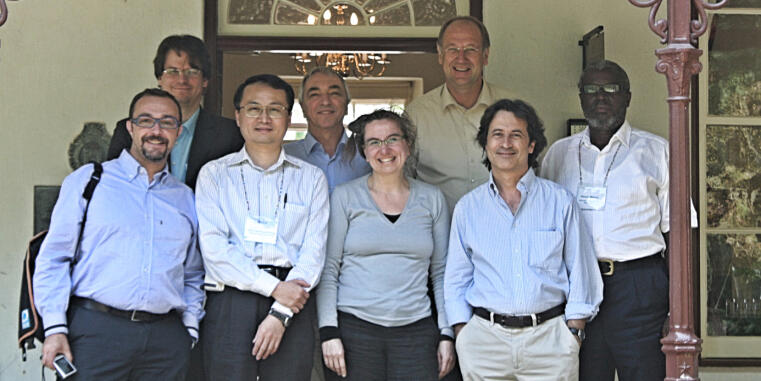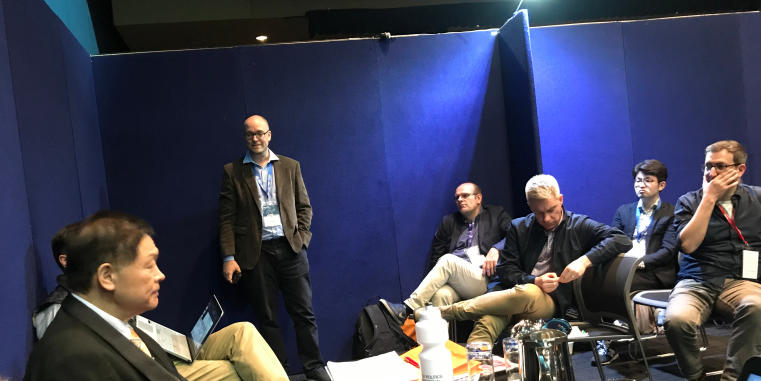







In 2010 a working group “Direct and deliberative democracy” (DDD) was established which worked on instrument such as referendum and initiatives as well as on new dialogical instruments as well as combinations (“hybrid democracy”). It analyses the mix of online and offline participation (blended democracy). The relation to representative democratic institutions is a special interest. Furthermore the focus on the quality and the integrity of direct and deliberative democracy. Here a Direct Democratic Integrity Index is generated in 2017.
Contact: norbert.kersting(at)uni-muenster.de
Kersting, Norbert 2023 Constitutional referendums and deliberation Direct democratic integrity in Russia, Italy, and Turkey. In: Min Reuchamps/ Yanina Welp (eds) 2023: Deliberative Constitution-making. Opportunities and Challenges. London: Routledge
Kersting, Norbert/ Tiphaine Magne/ Margarita Zavadskaya 2023 (forthcoming): Direct democracy integrity in modern authoritarian systems - The constitutional referendum in Turkey 2017 and Russian plebiscite in 2020. In: Journal of Lower States
Kersting, Norbert/Marta Regalia 2023: Direct democracy and its integrity. The Italian 2020 and the Turkey 2017 Constitutional Referendums. In: Zeitschrift für Vergleichende Politikwissenschaft
Norbert Kersting/Max Groemping 2021: Direct Democracy Integrity and the 2017 Constitutional Referendum in Turkey. A new research instrument. In: European Political Science (2021)
Supplementary Material
Panel: Direct and deliberative democracy and its integrity.
In RC06 Political Sociology
Convenor
Prof. Norbert Kersting
Chair
Dr. Max Grömping
Co-chair
Prof. Norbert Kersting
Discussant
Prof. Brigitte Geissel
Given the disappointments of liberal electoral democracies, election campaigns, and electoral results, scholars have advocated democratic innovations such as direct democratic and deliberative instruments in recent decades. "Direct democratic instruments" such as referendums and initiatives have become increasingly popular but are highly criticized (see Brexit referendum, Russian or the Turkish referendum). The new electoral integrity index covers there countries. "Dialogical deliberative instruments" - e.g. participatory budgeting, mini publics, or citizen assemblies - are en vogue in a number of countries, but some are criticized for their lack of effectiveness (tyranny of participation). Analyzing the integrity of these instruments puts the focus on the evaluation of procedural aspects in addition to outcomes. hat are the criteria of evaluation? Most instruments have online and offline components. Are there new or different criteria for online participation in this respect? What are best or bad practices in direct democracy and in deliberative democracy?
Beiträge
An Inquiry into the Conditions for political Participation in current Democracies
Author: Prof. Ricardo Angel Minetti, Argentina
Citizens' Assemblies and Direct Democracy
Author: Prof. Nenad Stojanovic, Switzerland
Connecting Citizens' Assembly with Citizens' Initiative: A Proposal
Author: Prof. Robert Podolnjak, Croatia
Direct democracy and integrity. Referendums in Turkey, Russia, Italy and Chile
Author: Prof. Norbert Kersting, Germany
Online Voting as Direct Democracy: Assessing the Effect on Open Government in Chile and Colombia
Author: Dr. Dmytro Khutkyy, Estonia
Co-Author: Mr. Eduardo Astudillo Laureda, Chile
Policy development as well as Constitutional review process are characterized by participatory democracy. According to the principle "first talk then vote", deliberative and direct democratic instruments become more important. But also digitalization is changing political participation. What are the online and offline instruments (blended participation) implemented. What are the benefits - what are the problems? This open meeting of the DDD (Direct and Deliberative Democracy)- group is focusing on the combination of online participation and offline participation.
Chair: Prof. Marian Mendoza
Discussants: Prof. Todd Shaw
Papers: Attitudes on Online Participation and Offline Participation
Norbert Kersting
Beyond transparency. Using open government and deliberative democracy to assess the quality of lobbying regulation
Alberto Bitonti, Claudia Mariotti
Do ICTs Improve Deliberative Quality of Constitutional Reforms?
Visvaldis Valtenbergs, Raphael Kies, Norbert Kersting, Marie Dufrasne, Alina Ostling
State Capacity and Public Policy Implementation of Open Data: The Brazilian Context
Murilo Borsio Bataglia, Ana Farranha
For further information on the panel and presented papers see the IPSA WC site
Direct democracy is critised. How can the deliberative quality be enhanced. What are the indictors evaluating online and offline instruments (blended participation)? What are the benefits - what are the problems? Is gamification a sucessful strategy? This meeting of the DDD (Direct and Deliberative Democracy)- group is focusing on the quality of direct and deliberative participation (online or offline or blended).
Chair: Antonia María Ruiz Jiménez
Discussants: Dr. Chetan Singai
Papers: Deliberative Democracy and Policy Making in India: The Case Study of National Education Policy
Chetan Singai, Nibras K. Thodika
Direct Democracy in Social Movements: Intersectional Technopolitical Media Practices in Brazil and Spain
Miss Luiza Aikawa
Online Campaigning and Devoted Users: Gamification and Engagement on Twitter in the 2019 EP Election Campaign
Francesco Grisolia, Antonio Martella, Roberta Bracciale, Maurizio Tesconi
The Institutionalization of Norms of Deliberation in the Design of Local Public Consultations in Germany and Poland
Anna Przybylska, Tobias Escher, Malte Steinbach, Marta Jas-Koziarkiewicz
For further information on the panel and presented papers see the IPSA WC site
The DDD research group focused on inegriy of direct and deliberative democracy. Included an elevation of the Turkish referedum by Max Grömpin and Norbert Kersting. The new research instrument direct ad deliberative democracy index (DDI) was tested.
A systemaical framework analyzed processual integrity. Furthermore a comparative study on global citien initiatives and global referendums. Other comparative studies analyzed Mexican cities and Barcelona.
Chair: Max Grömping
Discussant: Jensen Sass
Papers: The Comparative Research on the Global citizens Initiatives & Referendums of the Direct Democracy
Chang-Lin Li
Direct Democracy Integrity and Constititional referendum in Turkey in 2017. A new research instrument
Norbert Kersting, Max Grömping
Social and Political Innovation: The Case of the Metropolitan Are of Guadalajara in Constrast to that of Barcelona
Carlos Alberta Navarrete Ulloam
Measuring the Procedural Integrity of Democrativ Innovations with a Systemic Framework
Dannica Fleuß, Gary Schaal
For further information on the panel and presented papers see the IPSA WC site.
Referendums are en vogue. With the deliberative turn new „Dialogical deliberative instruments” were implemented in a number of countries. Direct and deliberative participatory instruments rely on electronic democracy and both use a mix out of online and online engagement (blended democracy). Some countries focus more on referendums and initiatives others seem to prefer participatory budgeting, mini publics, consensus conferences etc. Both democratic channels (and a combination of both) are seen as an innovation and addition for mainstream traditional representative democracies.
In a number of cases, decisions deriving from referendums and deliberative democratic instruments were accepted by the parliaments and executive and different interest groups seem to be satisfied. In other cases executive and legislative institutions reject the results (see for example Icelandic constitutional review). Some direct and deliberative participatory instruments are not able to channel growing political protest. What instruments are more successful? What is the opinion of elected politicians political administrators as well as citizen regarding the legitimacy of participatory instruments? What is the context for the success? What kind of actors are involved?
Convenor: Prof. Norbert Kersting
Chair: Dr. Giovanni Allegretti
Co-Chair: Prof. Maija Setälä
Discussants: Prof. Norbert Kersting
Abstracts:
Overcoming political indirectness: populism as radical democracy
Dr. Enrique Peruzzotti
Can an unconstitutional referendum be legit? The case of Spain - Catalonia
Ms. Mariana Lopes Alves
Democratic Innovations of EMU? Direct and Deliberative Participatory Experiments under Hard Constraints
Prof. Ulrike Liebert
Hybrid Participatory Budgeting: the Challenges of a Multi-channel Participation
Mr. Michelangelo Secchi
Unequally Succesful Participatory Instruments?: How Institutional Design Affects The Fate Of Policy Proposals
Mr. Pau Alarcón Pérez, Prof. Graham Smith, Mrs. Carolina Galais, Mr. Joan Font
With the new wave of democratization "Direct democratic instruments” such as referendums and initiatives became popular. With the deliberative turn new „Dialogical deliberative instruments” are en vogue in a number of countries. Some countries focus more on referendums and initiatives others seem to prefer participatory budgeting, mini publics, consensus conferences etc. Both democratic channels are seen as an innovation and addition for mainstream traditional representative democracies. Are these instruments enhancing legitimacy and are they able to channel growing political protest. Direct and deliberative participatory instruments rely on electronic democracy and both use a mix out of online and online engagement (blended democracy). The idea is to bridge these two fields of direct and deliberative democracy research (hybrid democracy). Its combination is rare (see e.g. British Colombia, Iceland). Is it useful to combine dialogical and direct democracy? If yes, how can dialogical democratic instruments and instruments of direct democracy (Initiatives and Referendums) be combined. Do type, sequence and timing matter? How can this be institutionalized? What is the role of political parties and social movements in these processes? Who are relevant actors supporting these instruments?
Convenor: Prof. Norbert Kersting
Chair: Prof. Norbert Kersting
Co-Chair: Dr. Giovanni Allegretti
Abstracts:
A CONSTITUTION BY THE PEOPLE? Deliberative and Direct Democracy in the Romanian 2013 Reform
Dr. Sergiu Gherghina, Prof. Sergiu Miscoiu
Democratic Participation and Deliberation in Crowdsourced Legislative Processes: The Case of the Law on Off-Road Traffic in Finland
Dr. Helene Landemore/Tanja Aitamurto
The Icelandic Democratic Project
Prof. Stefania Oskarsdottir, Prof. Jon Olafsson
The Role of Redundancy and Diversification In Multi-Channel Democratic Innovations
Dr. Paolo Spada, Dr. Giovanni Allegretti
Four Decades of Democratic Innovation Research: Revisiting Theories, Concepts and Methods
Chair: Prof. Norbert Kersting
Co-Chair: Prof. Maija Setälä
Discussants: Matt Qvortrup
Abstracts:
Combining Citizens’ Initiatives and Deliberation – The Case of Avoin Ministeriö
Presenter: Laura Nurminen, authors: Maija Jäske, Henrik Serup Christensen
The Cherry on Top or Too Much Salt in the Soup? Participatory Innovations in Swiss Local Direct Democracy
Philippe Koch (presenter), Nico van der Heiden, Daniel Kübler
Convenor: Prof. Norbert Kersting
Chair: Prof. Norbert Kersting
Co-Chair: Dr. Giovanni Allegretti
Discussants: Prof. Roland Roth
Prof. Eduardo Alsonso
Mr. Juan Cristóbal Portales
Prof. Gary Schaal
Ms. Claudi Ritzi
Dr. Maija Setälä
Dr. Enrique Peruzotti
Ms. Ana Claudia Teixeira
Miss Paula Pompeu Fiuza Lima
Mittwoch 9.-12. March 2011, Stellenbosch: STIAS
Direct and deliberative democracy. From innovative deliberation to binding referendum-
Mittwoch 9.-12. March 2011, Stellenbosch: STIAS
Kommen die Caravellen zurück? Während man in den 1970 er Jahren vor allem von einem Demokratieexport in die Dritte Welt sprach, hat sich dieser Trend anscheinend umgekehrt. In Latein¬amerika wird eine Vielzahl von Referenden implementiert (s. Uruguay). Neue deliberative Beteiligungsinstrumente wie z.B. der Bürgerhaushalt wurde im globalen Süden (Porto Alegre) entwickelt und haben in den letzten Jahren in den alten Demokratien Europas an¬gerei¬chert durch neue Informations- und Kommunikationstechnologien großen Anklang gefunden.
Ein zentrales Problem ist dabei die Verstetigung und Institutionalsierung der neuen delibera¬tiven Verfahren. Ein weiteren zukünftiges Themenfeld ist die Verknüpfung deliberativer Verfahren mit numerischen direktdemokratischen Verfahren Referenden und Initiativen.
Neben Brasilien und anderen lateinamerikanischen Laendern finden sich „best practices“ im Bereich Bürgerbeteiligung auch in Asien (Indien, Kerala). Auch Südafrika hat in der Verfassung, in der Kommunalgesetzgebung wie auch durch die Rechtsprechung des Verfassungsgerichts zu den soziooekonomischen Rechten -die oft Beteiligungsverfahren ein¬fordert- einzigartige rechtliche Rahmenbedingungen für Partrizipation. Die Verfassung Südafrikas sieht in allen politischen „Sphären“ die Nutzung moderner Beteiligungsin¬stru¬mente vor. Die white und green paper zur Local Governenmet benennen derartige Instrumente.
Sind neue Beteiligungsinstrumente (Citizen Jurys, Participatory budgeting, Forums, Referenden, Deliberative polls etc.) die Lösung zur Kanalisierung des Protests der sozialen Bewegungen? Kann man deliberative Verfahren institutionalisieren? Wie lassen sich Referenden und deliberative Verfahren verknüpfen? Um gegenseitige Lernprozesse zu ermoeglichen wird der Vergleich zwischen Europa, Asien ( Indien) und Lateinamerika (Brasilien) gesucht.